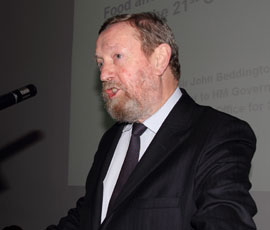Beddington: GM wheat protests misguided

The government’s chief scientist has condemned attempts by GM protesters to destroy a trial plot of GM wheat.
Professor John Beddington said the trial at Rothamsted Research could bring huge environmental benefits to farming.
Scientists at the Hertfordshire agricultural research institute are conducting an experimental trial of wheat that has been genetically modified to repel aphids.
And if the trial proves successful, it could resolve “real issues with pesticides” in aphids, added Prof Beddington.
“The proper processes have been gone through in terms of assessing its safety,” said Prof Beddington, speaking at the World Potato Congress, in Edinburgh, on Monday (28 May).
“It has been licensed by DEFRA. The attempted disruption did not happen and neither should it.”
Prof Beddington described the science being trialed at Rothamsted as “exciting” and said it was “very sad a group felt it should disrupt it”.
“I’m glad they weren’t able to,” he added.
Activists from the anti-GM protest group Take the Flour Back had vowed “mass action”, including an explicit threat to trash the GM wheat trial when they met at a rally at Rothamsted on Sunday.
But their attempts to gain access to the trial site to destroy the crop were foiled by a massive police presence of about 500 officers.
In the UK and Europe there is still reluctance among many to accept GM technology, but elsewhere biotech crops have been gaining ground, particularly in the Americas.
Prof Beddington, who coined the phrase “perfect storm” to describe the critical combination of food shortages, water scarcity and insufficient energy resources facing the world’s population, said GM would have to be a part of increasing food production in a sustainable way.
Trials of blight-resistant potatoes are currently under way at the John Innes Centre, Norwich.
And the conference was told a potato variety with blight resistance would offer greater yields and no need for pesticides to control the disease.
Prof Beddington, the author of the government’s Foresight report, published in February 2011, said food, water and energy poverty remained the fundamental challenges and a “climate-smart agriculture” was needed now to address the twin global challenges of population increase and climate change.
He added that the world’s population was estimated to reach nine billion before 2050 and about 40% more water will be needed by 2030.
“Climate change is happening and it will continue to happen,” said Prof Beddington.
“People have often said scientists exaggerate this to get research projects, but there’s an enormous body of evidence to show that it’s happening.”
Prof Beddington said action taken now to reduce greenhouse gas emissions would have a significant impact on how quickly the effects of climate change would impact on the world’s temperature.
In the worst-case scenario, he warned that the Arctic region could be as much as eight degrees warmer in 2070, but that could be delayed by as much as 30 years if the right course of action was taken,
Agriculture and climate change would be on the agenda of the G20 in June and the Rio20 in Brazil, said.
Read more
Find out more on our GM crops page.

